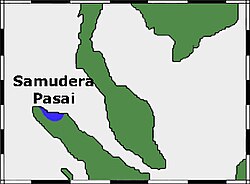Samudra Pasai
| Samudera Pasai Sultanate | ||||||||||
| Samudera Darussalam | ||||||||||
|
||||||||||
|
Map of Pasai, at today's Lhokseumawe of Sumatra, Aceh province.
|
||||||||||
| Capital | Pasai | |||||||||
| Languages | Malay language | |||||||||
| Religion | Sunni Islam | |||||||||
| Government | Monarchy | |||||||||
| Sultan | ||||||||||
| • | 1267–1297 | Malik ul Salih (founder) | ||||||||
| • | 1514–1517 | Zainal Abidin IV (last) | ||||||||
| History | ||||||||||
| • | Coronation | 1267 | ||||||||
| • | Portuguese invasion | 1521 | ||||||||
| Currency | Dirham coins | |||||||||
|
||||||||||
| Today part of |
|
|||||||||
Samudera Pasai, also known as Samudera and Pasai sometimes called Samudera Darussalam was a Muslim harbour kingdom on the north coast of Sumatra from the 13th to the 15th centuries CE. The kingdom was believed to have been founded by Merah Silu, who later converted to Islam and adopted the name Malik ul Salih, in the year 1267 CE.
Little evidence has been left to allow for historical study of the kingdom.
Based on the local literature Hikayat Raja-raja Pasai, 'Samudera' can be inferred to have come from the word 'Semudera' ([səmudəra]), which meant 'a very large ant'. The name was given by Merah Silu when he discovered an ant as large as a cat while hunting at a 'high ground'. Eventually, the place was cleared for the establishment of a new state and 'Semudera' was adopted as its name.
'Samudera' is also theorised to have been derived from Samudra meaning ocean in Sanskrit and Tamil.
The literature also indicates the origin of the name 'Pasai' which came from Si-Pasai, the hunting dog of Sultan Malik al Salleh, who was Merah Silu after his conversion to Islam. The legend narrates that Sultan Malik al Salleh, while hunting with the dog, encountered a deer which was not afraid of the dog's barking but instead barked back. He was bewildered by this and thought that this might be a good sign for the place to be established as a new state for his son Sultan Malik Al Tahir. The dog died after the state was established. Sultan Malik al Salleh buried the dog there and he eventually named the place after it.
Pasai exported its culture, and most importantly its language — an early form of Malay written in the Jawi alphabet — to a number of islands. Later, this language became the lingua franca among traders in what is now Indonesia and Malaysia.
Arab and Indian Muslims had traded in Indonesia and China for many centuries. A Muslim tombstone in eastern Java bears a date corresponding to 1082. But substantial evidence of Islam in Indonesia begins only in northern Sumatra at the end of the 13th century. Two small Muslim trading kingdoms existed by that time at Pasai and Peureulak or Perlak. A 1297 royal tomb at Samudra is inscribed entirely in Arabic. By the 15th century several harbour kingdoms developed, all ruled by local Muslim princes, from the north coast of Java and elsewhere to as far east as Ternate and Tidore in Maluku. Marco Polo spent five months here, he had Ferlec, Basma, and Samara (Samudera) mentioned in his travel story. Another famous traveller Ibn Battuta on his way to China stayed 15 days at Samudera.
...
Wikipedia

